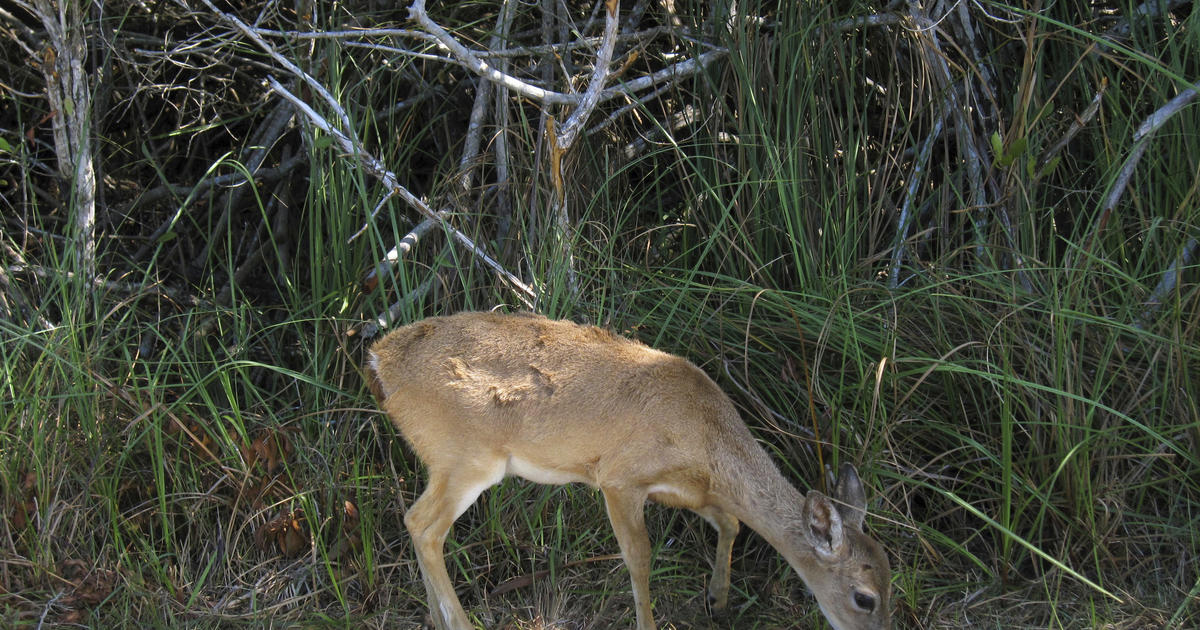Nyad Continues Cuba To Keys Quest
HAVANA (CBSMiami/AP) – Suffering through jellyfish stings on her face, Diana Nyad is in day two of her quest to swim from Cuba to Florida in shark-infested waters without a protective cage.
Nyad left Cuba Saturday in her latest bid to cross the Florida Straits since last summer, when first an asthma attack and then jellyfish stings forced her to abandon separate attempts.
The 62-year-old Los Angeles woman was said to be comfortable, confident and steady at around 50 strokes per minute after a harrowing night of painful jellyfish encounters — despite a new-and-improved bodysuit she hoped would offer better protection.
Nyad was stung four times during the night on the neck, lips, hand and forehead, according to members of her 50-member crew who updated fans through social media.
"Today is more like swimming," one member quoted her as saying, via Twitter. "I don't know what you would call last night ... probably surviving."
At 18 hours into the swim, she had traveled 21.7 miles from Havana. Choppy seas were calmer, and her team reported only a light wind.
Nyad had planned to don the bodysuit, which covers her from head to toe except for holes for the eyes, nose and mouth, at night, when jellyfish tend to rise to the surface. But it apparently did not work as well as anticipated.
At least two of the stings were from the dangerous box jellyfish, which forced her to cut short her second of two attempts last year as toxins built up in her system.
At one point, with jellyfish particles everywhere in the water, Nyad changed strokes to keep her face out of harm's way.
"There are so many jellyfish," said another tweet. "Diana is swimming backstroke right now leading with the cap-covered part of her head to minimize contact."
"The backstroke is working!" it added.
By day, the jellies receded, and she was able to resume freestyle swimming.
Nyad, who turns 63 Wednesday, is making her third attempt since last summer at a cageless crossing of the Straits of Florida. She also made a failed try with a cage in 1978.
Australian Susie Maroney successfully swam the Straits in 1997, but she used a used a cage. This June another Australian, Penny Palfrey, made it 79 miles toward Florida without a cage before strong currents forced her to abandon the attempt.
A kayak-borne apparatus shadowing Nyad helps keep sharks at bay by generating a faint electric field that is not noticeable to humans. A team of handlers is always on alert to dive in and distract any sharks that make it through.
One of those divers was also stung by a jellyfish.
Nyad, goggle-eyed with sun-bleached hair, said before she set out from Havana's Hemingway Marina on Saturday that she had braced herself for pain.
"There's a reason no one's ever done it, but I'm prepared," she said. "I may suffer some, but I'm prepared for that, too."
Nyad has been training for three years and is in peak shape, according to friend and trainer Bonnie Stoll.
The team expects Nyad will take at least 60 hours to complete the swim, meaning she would arrive in the Florida Keys sometime Tuesday.
She takes periodic short breaks to rest, hydrate and eat high-energy foods like peanut butter.
Besides sharks, jellyfish, the elements and the limits of human endurance, Nyad must contend with the monotony and sensory deprivation inevitable in marathon swimming.
To help, she relies on a mental playlist of about 65 songs mostly "from my generation." They include classics from the likes of Bob Dylan, the Beatles and Neil Young, plus Janis Joplin's chart-topping version of "Me and Bobby McGee."
"If I sing that 2,000 times in a row, the whole song, I will get through five hours and 15 minutes," Nyad said in a video posted on her website.
"It's kind of stupid," she added, "but it gets me through."
(TM and © Copyright 2012 CBS Radio Inc. and its relevant subsidiaries. CBS RADIO and EYE Logo TM and Copyright 2012 CBS Broadcasting Inc. Used under license. All Rights Reserved. This material may not be published, broadcast, rewritten, or redistributed. The Associated Press contributed to this report.)



